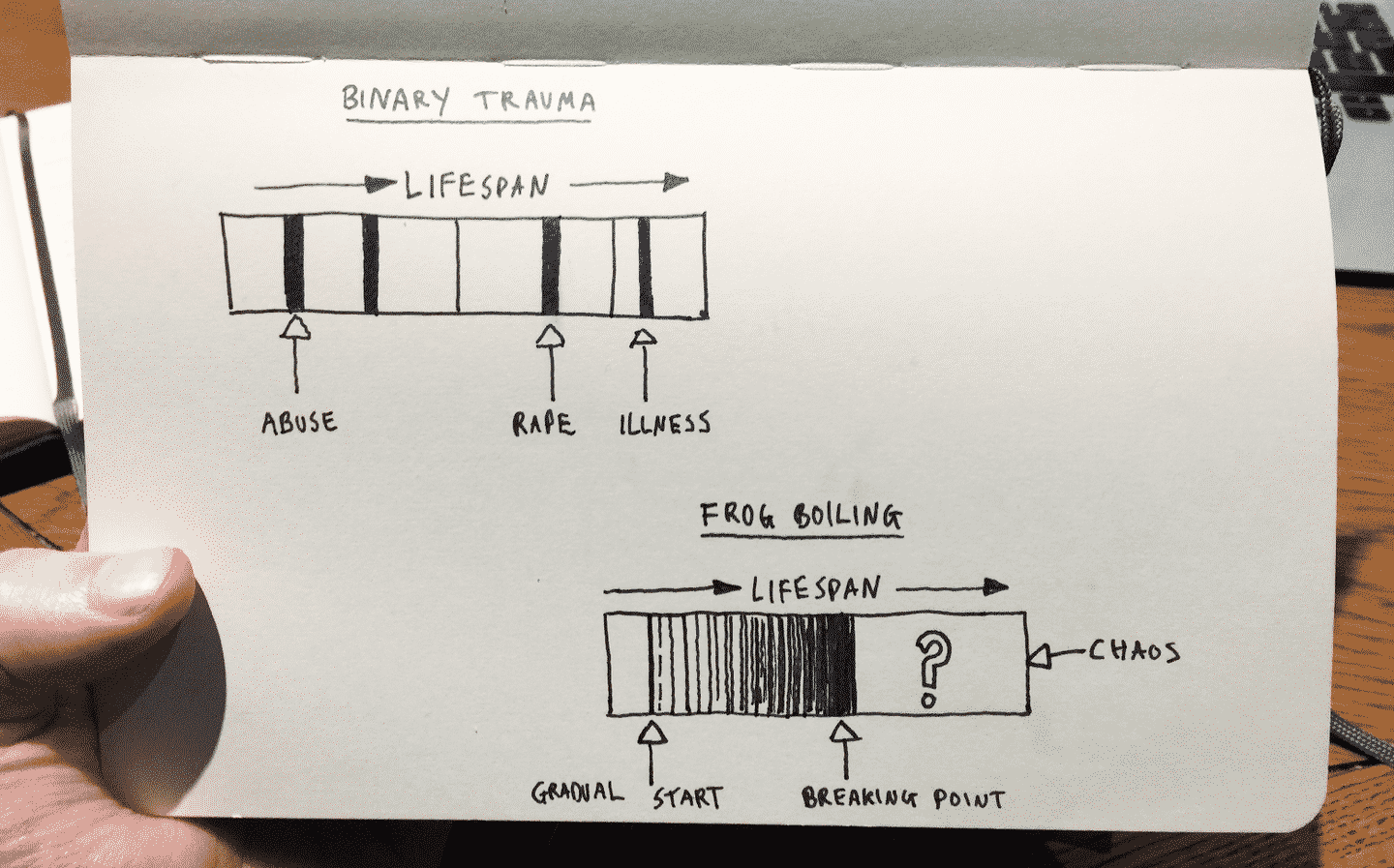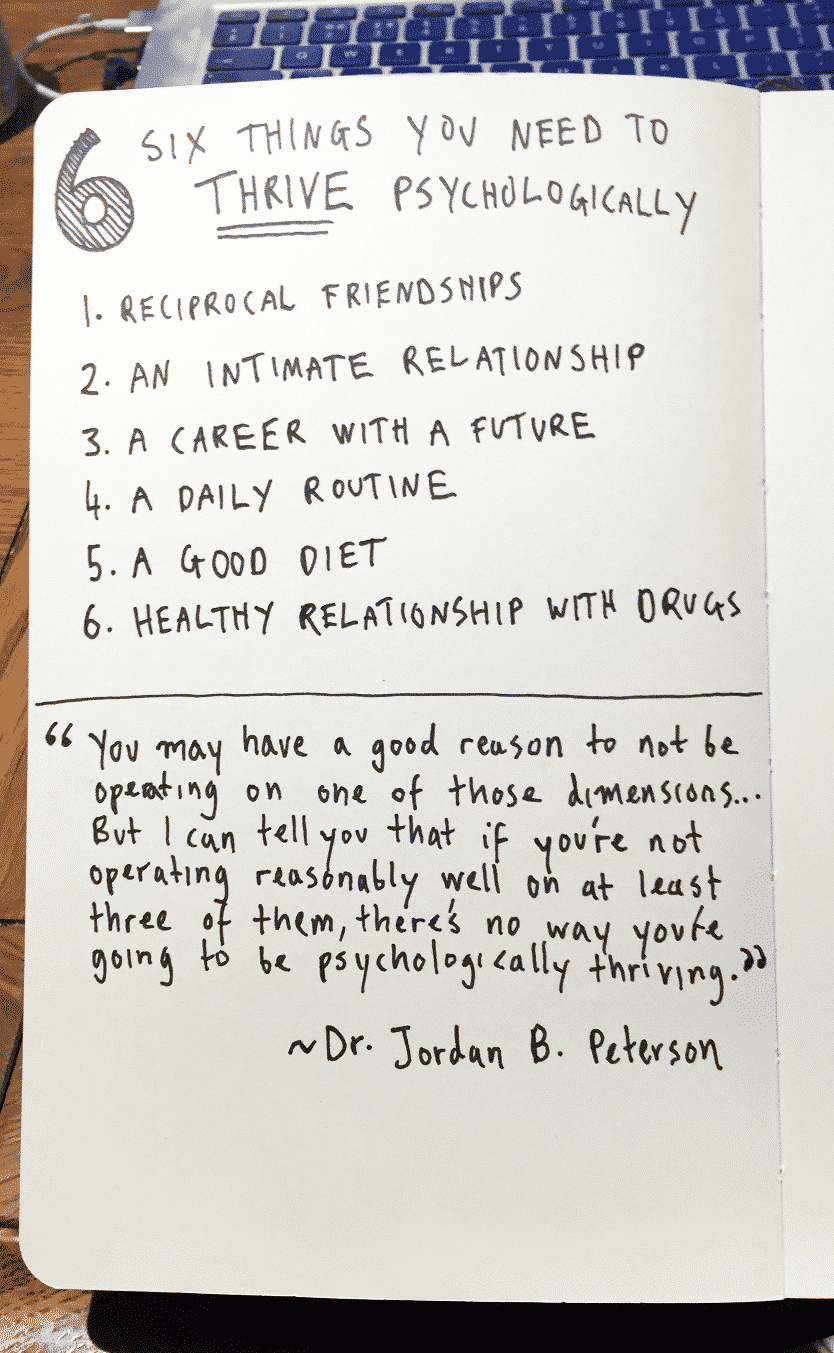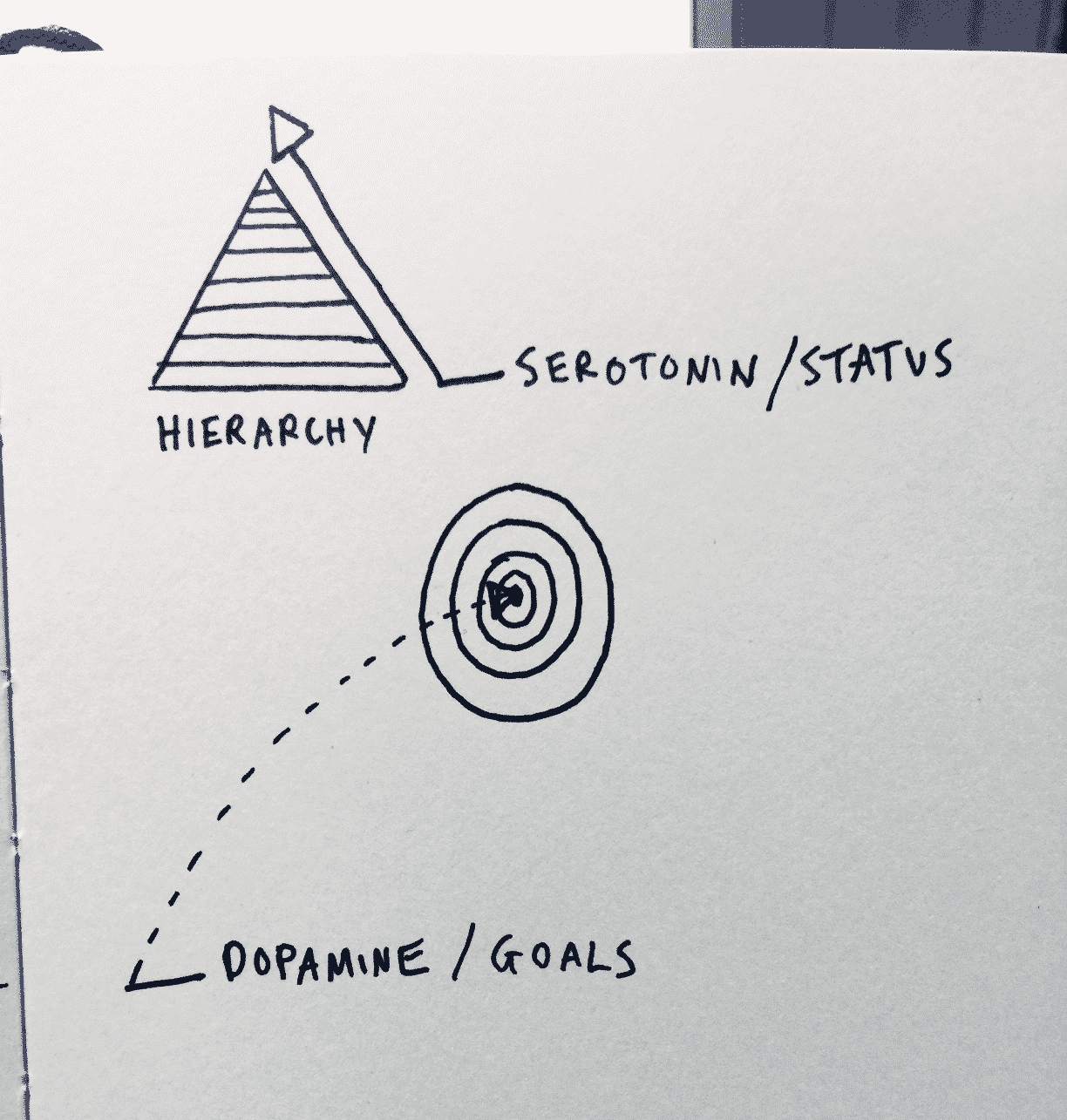Jon Brooks • • 17 min read
Jordan Peterson Clean Your Room in 6 Practical Steps

By now the Jordan Peterson clean your room meme is very well known. The idea is that your external world is an extension of your inner world and by cleaning up your room and reducing chaos, you clean up your life.
It’s a very good start.
Clean your room.
But what do you do when you have cleaned your room but your life isn’t where you want it to be still?
This article offers and extension of the Jordan Peterson clean your room idea and works with what Peterson calls the “6 essential things for a flourishing existence.”
Let’s get into it.
Nietzsche was wrong. That which doesn’t kill you does not always make you stronger.
That which doesn’t kill you can sometimes make you want to kill yourself.
We know that traumatic experiences can permanently rewire one’s brain so that it becomes hypervigliant, making life a living hell full of potential dangers that are invisible to non-traumatized people.
Trauma is typically an incident that shocks the body into a state of trapped terror. Traumatic experiences occur in memorable and sudden events such as a rape, attack, mugging, accident, insult, or serious betrayal. There is usually an element of malevolence involved.
But this is not the only way to be traumatized. There is another way, a way in which your whole life becomes one slow, gradual traumatic expression. The cause is too subtle to be detected and the symptoms occur too gradually to diagnose with accuracy.
I call this Frog Boiling.
There is an old saying that goes:
If you throw a frog in a pot of boiling water, it will immediately jump back out. But if you put a frog in a pot of cold water and gradually bring it to the boil, it will remain in the pot until it dies.
This is not scientifically correct, but it’s a great metaphor and highlights an important flaw of the human condition: when bad things occur gradually, they are difficult for us to detect until it’s too late.
Nowhere can Frog Boiling be seen more than in long-term relationships with family members, co-workers, friends, and partners.
Your boss might not rape you, but he may make progressively insensitive remarks toward you each passing month.
Your partner may not violently attack you, but they may play on your insecurities with the aim of eroding your self-esteem.
Your mother may not chain you up and starve you, but she may tell you subtle lies every day to make her own dissatisfaction with life more bearable.

If I were to pile beans on top of each other one by one, how many would I have to place down before it would be classed as a heap?
Imagine me doing this. 1 bean, 3 beans, 10 beans, 21 beans? Stop.
Okay, 21 beans. Now it’s a heap. But what if I remove 1 bean… are 20 beans not a heap? How about 17 beans?
Replace beans with small acts that do not serve your long-term interests, and you understand how Frog Boiling works.
The good news is that this type of trauma is escapable because it exists outside of yourself. The bad news is that it’s often very hard to detect, and even harder to get the momentum necessary to escape.
I jokingly criticized Nietzsche at the beginning of this article. I say jokingly because the man was a psychological genius. And one of my favorite aphorisms of his applies perfectly to frog boiling:
“When we are tired, we are attacked by ideas we conquered long ago.”
Frog Boiling can make us tired—stressed—and bring back old traumas and issues we conquered long ago. Frog Boiling can deplete us gradually and imperceptibly—it is a slow death. And Frog Boiling can be present in many aspects of your life, not just relationships.
In Dr. Jordan B. Peterson’s 2017 online lecture series Personality and Its Transformations, he lists the six basic things human beings need to thrive. We will use these as a template to examine the areas in which you are likely experiencing Frog Boiling and what to do about it.
Jordan Peterson Clean Your Room, Then Do These Six Things to Thrive Psychologically
”The psychoanalysts, I think, err too much on the side of the subject. They tend to think that too much of you is inside of you, and too little of you is outside of you. And part of the reason I believe that is because of my clinical experience. I love the psychoanalysts, man. They’re brilliant. They’re deep. They grapple with real problems. When people have real problems, and I mean profound problems, they’re really profound moral problems. They’re problems of good and evil, really. There are things going on in their family that are so terrible that they’re sometimes fatal. Lie upon lie upon lie upon lie for decades and decades and decades. It’s awful. And that’s not exactly inside them. It’s out there in the world…I’ve experienced, despite my love for the psychoanalysts, very frequently what I’m doing as a therapist is helping people have a life that would work.”

1. Reciprocal friendships
The golden question to detect Frog Boiling:
Does my relationship with this person/substance/habit TAKE much more than it GIVES?
Think about your friendships. Are they reciprocal? Do you feel like the value you give each other is somewhat equal?
Jordan Peterson has a fantastic guide to find out if a person is someone you want as your friend:
“Here’s how you know if someone’s your friend. You can tell them bad news; they’ll listen. They won’t tell you why you’re stupid and why that bad thing happened to you and how something worse happened to them once and, you know, derail the whole conversation. You can actually tell them bad news and they’ll listen. That’s a good thing. And this is a weirder thing: you can tell them good news and they’ll help you celebrate. And that’s a really good way of deciding who you should have around you. Because if you have someone around you, and, you know, something good happens and you’re kinda afraid to even admit it. Because, you know, God, something good happened to you and it’s like, you let that be known and it’ll certainly be taken away. So you come out and you sorta tell someone half-heartedly that something good happened to you. They give you a whack and, you know, talk about the great thing that happened to them three years ago, or worse the great thing that happened to someone they knew three years ago. It’s like go away from that person! They’re not helpful to you. And they’re not helpful to themselves either. You gotta think about this. You gotta surround yourself with people who want the best for the best part of you.”
Unfortunately, I have had many friends over the years that I felt a little bit shy about telling good news to, and I still do. It seems like whenever I tell these friends something good about myself they try to hijack the conversation by making pointless illogical jokes as I talk which interrupt me, or by relating everything back to them. That doesn’t mean these friends don’t provide value in their own way or that they’re bad people, but certainly they are operating in a paradigm that leaves little room for true intimacy and expression.
Luckily, I have also been blessed on my journey to meet individuals who want the best for the best part of me and nurture my growth by truly listening and supporting me in failure and celebrating with me in success. I have friends right now with whom I could leave a 20 minute voice message to about the great things that have happened to me and they would enjoy listening as if they themselves had that great thing happen to them.
But not everyone is so lucky. Some friendships can be truly toxic. Some friends do not want the best for you at all. In fact, they want you to fail. They want you to ruin your life, be influenced to do bad things. Some friends want you to cheat on your partner, want you to take highly-addictive drugs, want you to get bad grades at school. Some friends are no friends at all.
With these “friends” it’s tempting to accept them for who they are, to downplay their negatives. But do that at your own peril, for who you surround yourself with is no trivial matter. It shapes you. They become you, and you them. Choosing friends wisely can be a matter of life and death.
Action step: Make a list of your closest friends. Next to each friend, give them a score out from 1-10 on how good they are at listening to your good news and another score on how good they are at listening to your bad news. If you don’t have a few that are 8 or above, consider changing that. Make it a goal to build your social circle. You can use Jordan Peterson’s future authoring program to accomplish this. It’s never been easier. Use the internet and especially Facebook groups. Some of my best friends (and romantic relationships) I first met online.
2. Intimate relationship with someone that you can trust that maybe has a future.
I find it quite sad when I see people with the attitude of “taking what you can get” in regards to relationships. Many individuals suffer through years of arguments, bickering, put downs, and domination in a loveless relationship just because they find the lonely alternative too unbearable.
My view has always been pretty straightforward: I would much rather be single than to be in a relationship that’s not epic. Now, that doesn’t mean you shouldn’t fight with your parter… some fighting is good. In healthy relationships you work toward a shared vision, then for every 5-10 positive situations you get 1 situation that is negative and involves some dispute. If there is no disputing there is no psychological safety.
Frog Boiling in relationships, on the other hand, is more like a background hum of anxiety and tension that never leaves. It is caused by ego, pain, and insecurity. Eminem in his song Tragic Endings lyricizes beautifully about this set up:
In my moments of weakness
I openly admit this shit, I wouldn’t normally
I’m extremely self-conscious
And enormously
Insecure and she uses it to torture
When she torments me
It only turns to ammunition for her
In this war
When she gets going, she don’t stop
When I’m up, she’s like a downer
When I found her
It was love at first encounter
Plus, somehow, she must’ve took the carton
Of eggs off the counter
Cracked them and placed all the shells on the ground
For me to walk on when I’m around her
Eminem is saying that when he opens up and makes himself vulnerable—a vital step for for intimacy—his girlfriend uses what he says as ammunition to torture him. She is relentless and ruthless in her attacks. Whenever he is experiencing something positive she hovers over him like a cloud of negativity, pulling him back down into despair. When they first met she was intoxifying and easy to fall in love with, but that was soon to change. Now he spends his days walking around on eggshells, afraid of doing or saying the wrong thing incase the relationship suddenly cracks and he confronted with a volatile torrent of abuse.
Some signs of Frog Boiling in your relationship you need to look out for:
- You are unable to kindly criticize your partner
- Even though you have good intentions, you are made to feel guilty often
- You’re accused of things frequently without evidence
- Your partner gets into a bad mood in social situations with you
- You feel judged when talking to members of the opposite sex
- In arguments, very deep, hurtful, and provocative things are said to you
- You partner is known to overreact and act in volatile ways
- When you feel happy, your partner has a tendency to bring you down
- You are feeling less content in the relationship than before you met
- You are experiencing unusual anxieties that didn’t exist before the relationship
- You are feeling somewhat trapped or smothered by your relationship
- Your partner’s emotional needs take center stage over yours
- When you get into arguments they accept little to no responsibility for their behavior
Remember that it is also possible that you are also Frog Boiling your parter without your own knowledge. Be sure to examine your own intentions thoroughly before jumping to the conclusion that you are the helpless victim.
Action step: If the above signs describe your relationship at all, I would seriously recommend you do some soul searching to see if you want to remain in it. If you do, you can sometimes turn troubled relationships around with the right strategies. My favorite book on relationships is Feeling Good Together by David Burns. You can try following the advice inside, but if it doesn’t work and you remain seriously suffering you may want to cut your losses. The world has never been more abundant.
3. A career that puts you in a dominance hierarchy somewhere with some possibility of rising and stabilizing yourself.
In the documentary Stress, Portrait of a Killer, Professor Robert Sapolsky explains how one’s stress levels are directly proportional to the rank they’re at in their dominance hierarchy—just like baboons. People at the top of the dominance hierarchy experience less stress and more positive emotion. People at the bottom of the dominance hierarchy experience more stress, more illness, and are more impulsive. As one’s status increases, one gets an increase in serotonin (just like when one uses antidepressants) which helps protect against negative emotion.
On the flip side to this, the nuerochemical dopamine—which is part of the “seeking system”—motivates you to attain your goals. If you are hungry and you see a plate of food, your dopamine system fires up so that you become excited to eat the food. Dopamine is analgesic and produces, essentially, the feeling of happiness.

In light of this, it makes sense why we would need to be inside the dominance hierarchy with the possibility of rising up. The higher we rise, the better we feel. But the goal of rising also produces dopamine and happiness in its own right.
Low serotonin means decreased confidence. Low serotonin means more response to stress and costlier physical preparedness for emergency— as anything whatsoever may happen, at any time, at the bottom of the dominance hierarchy (and rarely something good). Low serotonin means less happiness, more pain and anxiety, more illness, and a shorter lifespan— among humans, just as among crustaceans. Higher spots in the dominance hierarchy, and the higher serotonin levels typical of those who inhabit them, are characterized by less illness, misery and death, even when factors such as absolute income— or number of decaying food scraps— are held constant. The importance of this can hardly be overstated.
— Jordan B. Peterson, 12 Rules for Life: An Antidote to Chaos
Frog Boiling in terms of your career is likely to occur when you are being blocked from rising up. If you find yourself in a career with no way to earn more salary, earn more respect, or earn more skills and it feels a lot like a dead end, you should have a really good reason for not changing it.
Action step: Think about your current career, and meditate on the following questions. In a year from now is it likely you’ll be in a better position? Do you have any career goals that you can fulfill with your current job? Is your intelligence somewhat matched to your career? If the answer to these questions is “no,” what realistically attainable job would you like instead? Make an intention to start looking for this kind of job online.
4. Schedule and a routine
You cannot be mentally healthy without a routine. Pick a time to get up. Whatever time you want. But pick one and stick to it, because otherwise you disregulate your circadian rhythms, and they regulate your mood.
— Jordan Peterson
When I was in university studying filmmaking I would drink a lot of caffeine in the day and stay up till 4-5am talking with my roommates, reading, or watching films. In the winter, sometimes I woke up when it was already dark outside. Looking back, I don’t think my mood was all that good back then. I was pretty anxious and depressed. I probably looked for the answer to my anxiety in a book or piece of information, but as with all cases of Frog Boiling the answer was right in front of me: I needed get a schedule and to wake up at more consistent times. If someone told me this then, I would have probably argued against it.
“No, my routine is fine! Many of the greatest geniuses sleep late! I also heard Hans Zimmer say he gets up at 1PM.”
These were poor excuses. I was not Hans Zimmer. I did not structure my day. I did not wake up for anything in particular. I woke up at 1PM or later simply because that’s the time I woke up. As Jordan Peterson says, it’s not that important when you wake up, but what is important is that the time you wake up is consistent and you plan your day accordingly. If you let this area of your life slide, it’s likely that you will start to suffer.
Action step: Use Google Calendar, and set up your ideal week (use this article I wrote on routines as your guide). Be sure to include things you actually enjoy as well as your responsibilities. For your specific tasks, I like to use a to-do list every day. Currently I’m using Productivity Planner , and I love it.
5. Good diet
Diet is also a huge Frog Boiling hotpoint. That bag of cookies or bottle of Coke you’re consuming each day, does not seem bad now. And that 0.5lbs you’re gaining each week does not seem dangerous either. But keep going and you’ll soon find yourself in huge trouble. Losing weight and keeping it off is damn hard.
If you do not have a good diet, with adequate calories, protein, fiber, greens, and water do not expect to thrive. You are a bag of chemicals, and your entire life depends on your metabolic process. In some sense, you are a biological machine; and any machine needs regular maintenance.
It’s unbelievable to think of all the suffering that occurs on our planet just because people aren’t eating properly—either too much or too little. You don’t eat properly, you can’t focus or sleep properly. Your hormones don’t function as well as they could. Your blood sugar is all over the place. You feel tired and drained.
I counsel my clients to eat a fat and protein-heavy breakfast as soon as possible after they awaken (no simple carbohydrates, no sugars, as they are digested too rapidly, and produce a blood-sugar spike and rapid dip). This is because anxious and depressed people are already stressed, particularly if their lives have not been under control for a good while. Their bodies are therefore primed to hypersecrete insulin, if they engage in any complex or demanding activity. If they do so after fasting all night and before eating, the excess insulin in their bloodstream will mop up all their blood sugar. Then they become hypoglycemic and psychophysiologically unstable. All day. Their systems cannot be reset until after more sleep. I have had many clients whose anxiety was reduced to subclinical levels merely because they started to sleep on a predictable schedule and eat breakfast.
— Jordan B. Peterson, 12 Rules for Life: An Antidote to Chaos
It’s also quite understandable to see how people get in trouble with their diets. Frog Boiling is a slow process that kills you without your knowledge. That nice snack you buy from the shop each day does not kill you. It makes you feel good in the short term. But two years later you’re fat, depressed, and ill. This is why it’s vital that you review your overall diet every few weeks and make big changes.
Some basic daily requirements for most people:
- Eat a minimum of 20g of fiber
- Eat a solid breakfast (unless you are consciously fasting)
- Eat some fruit and veg
- Drink at least 2 liters of water
- Consume protein
- Take the supplements you need (guide)
Action step: For the next week, keep a food diary. Write down what you eat and when. Also write down if you experience any powerful moods. At the end of the week, review your entries and spend 20 minutes setting up a plan of action to improve your diet moving forward.
6. Regulate your use of drugs and alcohol
Frogs love water, that’s why in the Frog Boiling metaphor they stay in the pot until it kills them. They believe they’re doing something that serves them until it’s too late.
Likewise, drugs can be very medicinal. After a stressful day at work, coming home and cracking open a beer can be serenely blissful. That’s how it starts. But the dark side of drugs—and alcohol is absolutely a drug—is that it causes attachment. Suddenly, without that drink at the end of the day is not simply a bonus, it’s a necessity.
Imagine a person who enjoys alcohol, perhaps a bit too much. He has a quick three or four drinks. His blood alcohol level spikes sharply. This can be extremely exhilarating, particularly for someone who has a genetic predisposition to alcoholism. But it only occurs while blood alcohol levels are actively rising, and that only continues if the drinker keeps drinking. When he stops, not only does his blood alcohol level plateau and then start to sink, but his body begins to produce a variety of toxins, as it metabolizes the ethanol already consumed. He also starts to experience alcohol withdrawal, as the anxiety systems that were suppressed during intoxication start to hyper-respond. A hangover is alcohol withdrawal (which quite frequently kills withdrawing alcoholics), and it starts all too soon after drinking ceases. To continue the warm glow, and stave off the unpleasant aftermath, the drinker may just continue to drink, until all the liquor in his house is consumed, the bars are closed and his money is spent. The next day, the drinker wakes up, badly hungover. So far, this is just unfortunate. The real trouble starts when he discovers that his hangover can be “cured” with a few more drinks the morning after. Such a cure is, of course, temporary. It merely pushes the withdrawal symptoms a bit further into the future. But that might be what is required, in the short term, if the misery is sufficiently acute. So now he has learned to drink to cure his hangover. When the medication causes the disease, a positive feedback loop has been established. Alcoholism can quickly emerge under such conditions.
— Jordan B. Peterson, 12 Rules for Life: An Antidote to Chaos
Looking back over my life, 80% of my most traumatic experiences involved alcohol in some form. Most of the worst arguments I’ve had also involved alcohol. Most of the family disputes I’ve beared witness to involved alcohol also. Alcohol, can be a very destructive drug if not used with great care. But also worth noting is excess-caffeine and cigarettes. Two popular vices that provide at best anti-climactic pleasure and at worst serious damage to your life and health.
Remember the golden rule of Frog Boiling:
If it takes from you more than it gives to you, stop.
Action step: For the next 30 days, give up all psychoactive compounds—all drugs. At the end of the 30 day period see if you feel better. If you want you can mindfully reintroduce drugs into your lifestyle. But if you cannot go 30 days without drugs, it’s like that you are very attached to them. This is the first challenge in our spiritual obstacle course 30 Challenges to Enlightenment for a reason.
Conclusion: Jordan Peterson Clean Your Room First, Then Your Life
If you are unhappy and you feel like you have depression or anxiety, it’s quite possible that there is something in your environment—out there rather than in here—that is at the cause. It’s also quite possibly that you are blind to this cause because it has crept up on you and become a normal part of your life.
It’s very good to keep your emotions in check. You can meditate, journal, read, exercise, and practice gratitude. But sometimes this just is not enough. You also need to manage your externals. You need to make sure that you have the six domains necessary to thrive in working order. As Francis Bacon said, “Nature to be commanded, must be obeyed.”
Examine your life. Examine your relationships. Examine your habits and your hobbies, your flaws and your virtues. Dive into you history and contemplate your future. Where are the leaks? What is the obvious thing you are not doing. Start there today. No more procrastination. If you want to live a radically epic life, you need to do radical things.

Jon Brooks
Jon Brooks is a Stoicism teacher and, crucially, practitioner. His Stoic meditations have accumulated thousands of listens, and he has created his own Stoic training program for modern-day Stoics.










